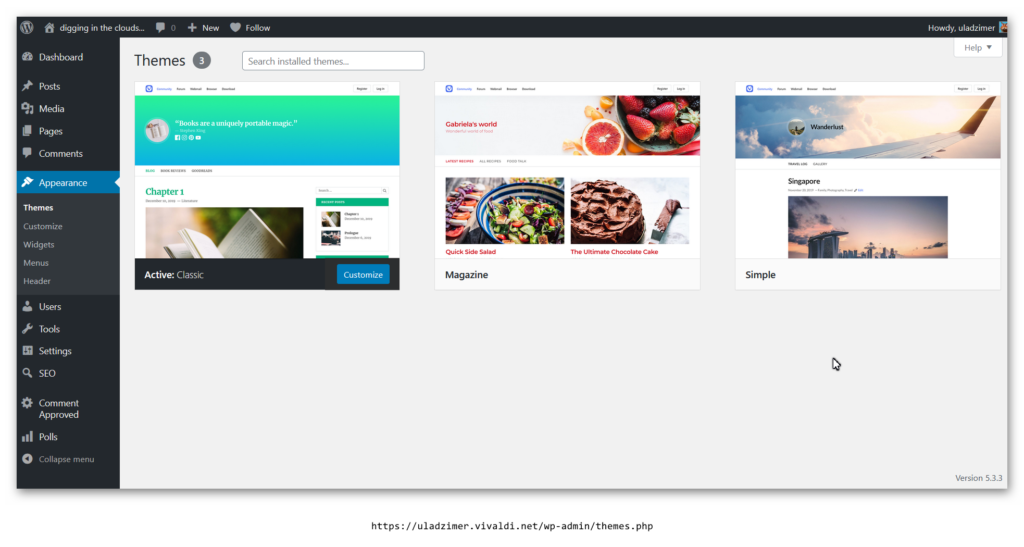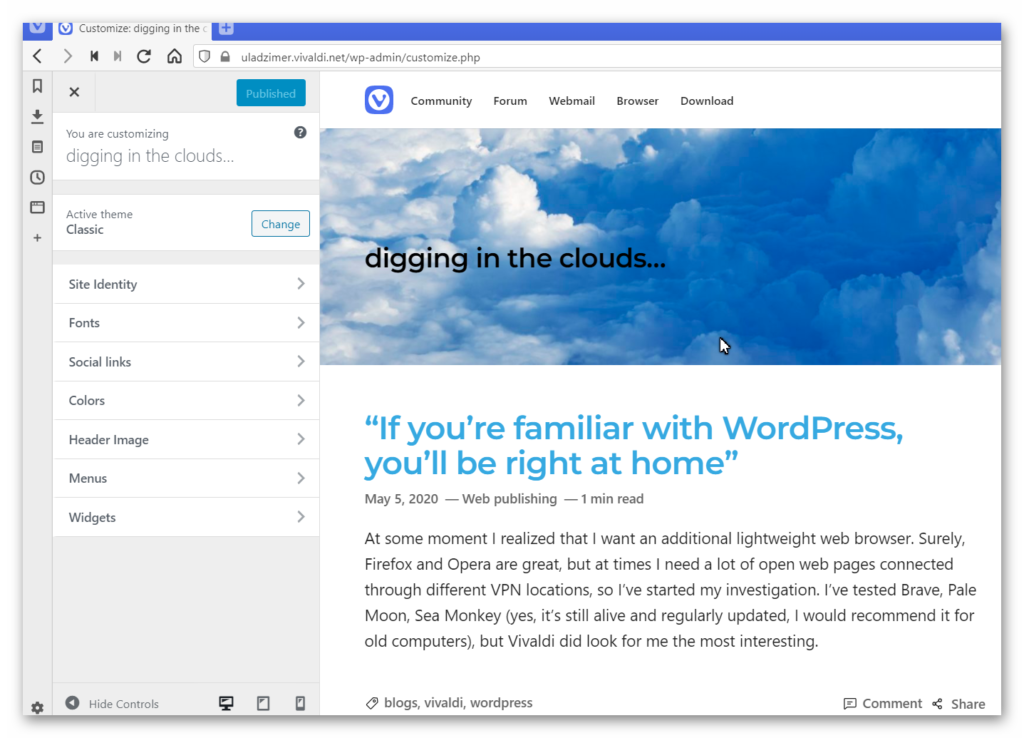At some moment I realized that I want an additional lightweight web browser. Surely, Firefox and Opera are great, but at times I need a lot of open web pages connected through different VPN locations etc etc, so I’ve started my investigation. I’ve tested Brave, Pale Moon, even Sea Monkey (yes, it’s still alive and regularly updated, I would recommend it for old’n’slow computers), but Vivaldi did look for me as the most interesting option.
Yes, the browser fits my requirements almost perfectly, it easily imports Chrome extensions for various VPN services, Evernote, Sticky Password, it’s even nicely localized. So I am pretty happy with it (except the issue with eBay captures, which I hope will be solved sooner or later). But it presents also a couple of nice bonuses. One is their web based email (like <username>@vivaldi.net) available for every registered user and another is named “My Blog”.
The blog address looks like <username>.vivaldi.net, I’ve entered automatically “wp-admin” at the end and yes, it’s a native WordPress blog! Of course, it’s quite simple and even more restricted than WordPress.com, for instance there are only 3 themes you can use with your site and unfortunately there’s no way to install your favorite plugins, I am still checking how much can I customize it. Undoubtedly if you are experienced in full functional WordPress site building it will look rather humbly, but as for own free lightweight blog with the nice and easy to remember URL it’s a great option I think!

So I’ve considered this option worth to be utilized and going add here at times some my notes related to anything I found interesting. But perhaps it will be mostly about cloud services, web site building, software utilities – all these toys I like to play with.
See you!



What I am really missing here is the JetPack plugin. Will try contacting vivaldi team regarding this question.
First of all, you don’t need Vivaldi browser to use Vivaldi community services, they work fine with other browsers, like any Web service should do. It goes on the opposite direction as well, you can use Vivaldi browser without any Vivaldi community account. Of course, it gets useful when you want to ask questions, make suggestions and such.
Unfortunately there isn’t anything like “a lightweight Web browser”.
Nowadays browsers are very very complex software that includes any sort of “not so necessary” new function and feature, like, lets make an example, a 3D rendering engine in case you want to build some “virtual reality” environment for who knows what, maybe “Web games”, plus like 20 or 30 years of legacy stuff. Even worse, only two major players survive and those two, Mozilla and Google, distribute the code base on top of which any existing browser is built.
Vivaldi is built on top of Chromium, Google’s code base. It is meant to add a customization layer and to be more “private” by not reporting to Google. Vivaldi is not “lighter” than any other browser made with the same code base, including Chrome. All those browsers have the same general features and performance. It cannot be another way because Vivaldi doesn’t have the manpower to develop an independent browser either to fork Chromium.
Performance isn’t the real issue here. The elephant in the room is that Google decides what features Vivaldi, like any other browser in the same “lineage”, can or should have, by making changes in the shared code base. A classic example is the recently added “content filter”. Google, whose revenues come from advertising and collecting user data, wants to make some changes that makes it impossible for extensions to filter content out of Web pages. Vivaldi cannot maintain a fork of Google’s code with the removed features and keep extensions working, besides those disabled extensions would not be distributed by Google’s store any more so Vivaldi should also have its own store. Here we are, Vivaldi add some basic filtering capability on top of Chromium as part of the customization layer so in theory killed extensions are not needed by most Vivaldi users. But in the end, Vivaldi, like anybody else who use their code, just copes with Google’s decisions.
In some way it is even worse for Mozilla. They follow Google’s decisions only because they think it is wise to copy the bigger player instead of being different. They ditched not one but two “platforms” for developing extensions and their whole ecosystem to adopt Google’s standard of “WebExtensions”. Now we will see what they do with the same issue described above, if they comply or decide to diverge from Google and keep those extensions working.
Thank you for such the detailed and professional comment, John. That’s right, there are no perfect browsers in the World. And of course there are no browsers lighter than Lynx (an old good console browser in Unix :-)) So it’s frequently a question of someones personal perception, and also some experience with highly resources consuming pieces of software like Firefox or some highly annoing ones like … you know 🙂
My favorite browser is still Opera, but I should admit people from Vivaldi made a good job and it would be interesting to see how their product will succeed further.
Thank you once again! Take care!
Mmm… I guess you still miss the point. There are only TWO browsers, one made by Mozilla e one made by Google. Opera is another “derivative” based on Chromium, like Vivaldi, like MS Edge and many others. In Vivaldi you get a ton of preferences to customize the “look and feel” and to add some functions to make the “user experience” better, more sophisticated. But under the hood the “engine” is the same as Opera, Edge and so on.
Those TWO browsers don’t aim to be “perfect”.
In time the meaning of “browser” has changed and at times it became quite close to something like “operating system” or “software development environment”. Meaning you could have a whole desktop inside the browser (see Chromebooks, see dead FirefoxOS) and/or you could build any sort of program with “web technologies” to run inside the browser, like games, office suites (see Google Docs) and so on. Given the fact that those TWO browser want to be everything and do everything, they must be bloated, full of bugs and regressions, they get tons of code added then removed when big plans change. Right now I have two Web pages opened in a Firefox derivative and I need 1Giga of RAM. At the time of the very first version of Firefox my PC had 128Mega of RAM in total and I was doing more or less the same things as today.
I hope I gave you some perspective on the topic.
Oh yes, there is Lynx and in theory I could dig in the closet and find some floppy disk with Mosaic. 🙂
The key of that kind of “success” is to forbid people to chose.
Vivaldi is better than nothing but it gives you some options on top of a whole nobody but Google can steer.
Vivaldi tries to revive old days at Opera when it was an independent browser with the will and ability to be different and innovate. But the context it totally different.
When you say “the Web is about standards” it translates in totally different meaning depending on the fact that there are several players who must agree on those standards versus one single player whose decisions become the “stardard de facto”.
I would also add that marketing is some sort of “jedi mind trick” that works only on weak minds. You chose software because it suits your needs and/or because you need to make a stand.
I am afraid guys at Microsoft may disagree :-)))))) I avoid using their IE an Edge under any circumstances, but they still exist.
Agree regading engines. But if you buy a car you look not only at the engine specification, you choose the car with a specific design, color and even a brand name which you prefer today in the morning. There is some part of common sense and some part of marketing. I suppose the same would be correct for bowsers.